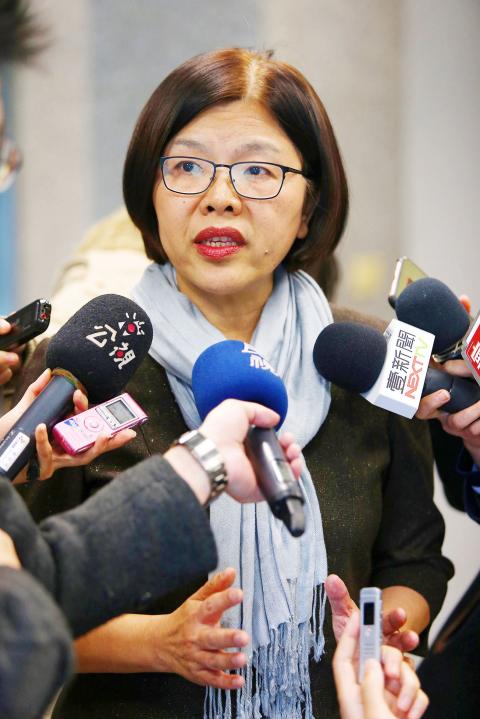The Ill-gotten Party Assets Settlement Committee is to reopen an investigation into the Chinese Nationalist Party’s (KMT) acquisition of the land housing the party’s National Development and Research Institute to determine if it involved any impropriety.
The committee is to hold a hearing in May and if the acquisition was found to have involved an abuse of government power, the KMT would have to return the illicit gains, committee spokeswoman Shih Chin-fang (施錦芳) said yesterday.
The institute sits on an 8,300 ping (2.74 hectare) plot of land in Taipei’s Muzha District (木柵), which the KMT acquired in 1964 during its one-party rule.

Photo: CNA
Yeh Sung-jen (葉頌仁), son of the original landowner, filed a complaint with the committee in October last year, accusing the KMT of illegally seizing the property.
Yeh accused the KMT of attempting to force his father to sell the land to it for NT$191,100 (US$6,178 at the current exchange rate), or about NT$5 per ping, well below the market value at the time, which was NT$200 per ping.
His father was unwilling to sell the property, but the KMT nonetheless had the land transferred into its name and deposited NT$19,000 — about one-tenth of the amount stated in the contract offered — with the courts, Yeh said.
The elder Yeh refused to take the money, which, in effect, allowed the KMT to take over the property without compensation, his son said.
Yeh Sung-jen sued the KMT in 2007, accusing it of abuse of power and demanding that it either return the property or pay NT$78.56 million in compensation, but a court ruled in favor of the KMT, saying there was no proof that Yeh’s father had been forced to sell the land.
Shih said the court ruling centered on Yeh’s demand to return the property to his family, instead of determining if the acquisition involved abuse of government power, which would be the focus of the committee’s investigation.
“If the rights of the people involved in the acquisition were infringed, we would seek to have [the KMT] return [improper gains] in the spirit of transitional justice,” she said.
The committee would seek to determine the legitimacy of the acquisition, and it would hand over any new evidence to the judiciary, she said.
The case would be the committee’s first attempt to address cases in which a final court verdict was handed down.
The KMT responded angrily to news of the probe, with Culture and Communications Committee deputy director Hu Wen-chi (胡文琦) accusing the committee of rehashing old issues.
“The KMT disapproves of how the committee has let its administrative power override judicial authority and how the Democratic Progressive Party is trying to reheat leftovers,” Hu said.
Hu said the KMT can undoubtedly withstand scrutiny, urging the committee to avoid applying double standards and to also look into the Taiwan Research Institute founded by former president Lee Teng-hui (李登輝).
The KMT has claimed that Lee instructed former KMT treasurer Liu Tai-ying (劉泰英) to sell the land housing the Broadcasting Corp of China, which the party used to own, on Taipei’s Renai Road in 1999 at an unreasonably low price to a construction company.
As about NT$290 million of the money from the sale was allegedly later given to the Taiwan Research Institute, the KMT called on the committee to also determine if the institute is an organization affiliated with the KMT.
Additional reporting by Stacy Hsu

The Ministry of Education (MOE) is to launch a new program to encourage international students to stay in Taiwan and explore job opportunities here after graduation, Deputy Minister of Education Yeh Ping-cheng (葉丙成) said on Friday. The government would provide full scholarships for international students to further their studies for two years in Taiwan, so those who want to pursue a master’s degree can consider applying for the program, he said. The fields included are science, technology, engineering, mathematics, semiconductors and finance, Yeh added. The program, called “Intense 2+2,” would also assist international students who completed the two years of further studies in

The brilliant blue waters, thick foliage and bucolic atmosphere on this seemingly idyllic archipelago deep in the Pacific Ocean belie the key role it now plays in a titanic geopolitical struggle. Palau is again on the front line as China, and the US and its allies prepare their forces in an intensifying contest for control over the Asia-Pacific region. The democratic nation of just 17,000 people hosts US-controlled airstrips and soon-to-be-completed radar installations that the US military describes as “critical” to monitoring vast swathes of water and airspace. It is also a key piece of the second island chain, a string of

Taiwan will now have four additional national holidays after the Legislative Yuan passed an amendment today, which also made Labor Day a national holiday for all sectors. The Chinese Nationalist Party (KMT) and Taiwan People’s Party (TPP) used their majority in the Legislative Yuan to pass the amendment to the Act on Implementing Memorial Days and State Holidays (紀念日及節日實施辦法), which the parties jointly proposed, in its third and final reading today. The legislature passed the bill to amend the act, which is currently enforced administratively, raising it to the legal level. The new legislation recognizes Confucius’ birthday on Sept. 28, the

Former president Tsai Ing-wen (蔡英文) departed for Europe on Friday night, with planned stops in Lithuania and Denmark. Tsai arrived at Taiwan Taoyuan International Airport on Friday night, but did not speak to reporters before departing. Tsai wrote on social media later that the purpose of the trip was to reaffirm the commitment of Taiwanese to working with democratic allies to promote regional security and stability, upholding freedom and democracy, and defending their homeland. She also expressed hope that through joint efforts, Taiwan and Europe would continue to be partners building up economic resilience on the global stage. The former president was to first